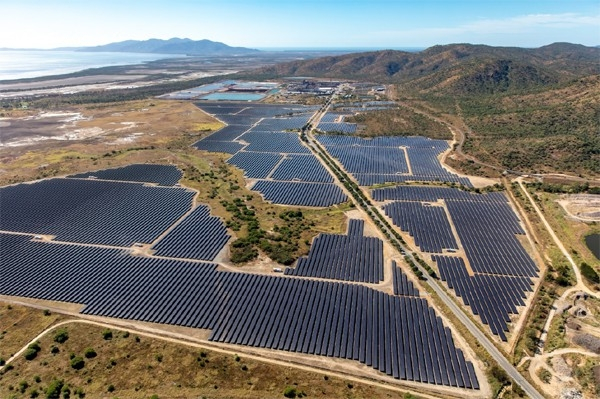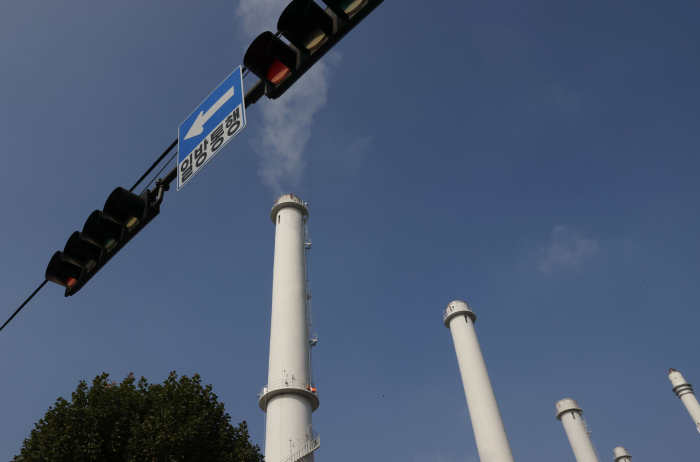Energy
S.Korea urged to embrace nuclear power to go carbon free
Industry insiders call for replacing RE100 with S.Korean version of Carbon Free 100 as net-zero emission target
By Feb 07, 2022 (Gmt+09:00)
3
Min read
Most Read
Alibaba eyes 1st investment in Korean e-commerce platform


Blackstone signs over $1 bn deal with MBK for 1st exit in Korea


NPS loses $1.2 bn in local stocks in Q1 on weak battery shares


OCI to invest up to $1.5 bn in MalaysiaŌĆÖs polysilicon plant


Korea's Lotte Insurance put on market for around $1.5 bn



The topic of RE100, a multinational campaign to make a full switch to renewable energy by 2050, was brought up last week during a debate among four candidates for South Korea's presidential election.
Environmental activists argue that RE100 is a key step toward achieving the net-zero carbon emission goal by 2050, considering that global brands such as Apple Inc. suggest South Korean suppliers sign up to the RE100 pledge.
But industry insiders demand that Asia's No. 4 economy, highly dependent on the manufacturing industry, go with the South Korean version of Carbon Free 100, or 100% carbon-free electricity generation, which includes nuclear power. They said that RE100 is just a campaign initiated by a non-profit organization and swayed by service industry-focused Europe and the US.
The Climate Group, a London-based organization, kicked off the RE100 campaign in 2014. Over 349 companies around the world made a commitment to the initiative, of which non-manufacturing companies account for 80.8%.
They are composed of the companies that consume the most electricity at more than 100 gigawatt hours a year, including Apple, General Motors Co. and IKEA, a Swedish furniture brand.
While the majority of the members are from Europe and the US, only 14 South Korean companies joined the initiative, including eight SK Group companies, battery maker LG Energy Solution Ltd and Korea Zinc Inc.┬Ā┬Ā
DETAILS OF RE100
In their first year of membership, they need to submit implementation plans and get them reviewed on a yearly basis. To maintain their membership, they must switch to renewables for 60% of their electricity consumption by 2030 and then 90% by 2040.
Alternatively, they may buy renewable energy certificates (RECs) from power providers on the open market to reach their commitments. RECs are market-based instruments that certify one megawatt-hour of electricity generated from a renewable energy resource.
In South Korea, RE100 members can also invest in renewable energy projects or pay higher energy prices to compensate for their failures in meeting the objectives.

Samsung Electronics Co., which has yet to participate in the RE100 campaign, has already switched to 100% renewables for overseas operations. But its domestic facilities are far behind in reducing their carbon footprint because of a lack of renewable energy sources at home.┬Ā
Renewable energy makes up only 6.7% of South Korea's electricity generation as of November of last year, according to the Ministry of Trade, Industry and Energy.
That compared with the European Union's 15.3% as of 2019. Excluding Eastern European heavily reliant on nuclear and coal-fired electricity, renewables take up nearly 40% of Western Europe's energy consumption.
NUCLEAR PHASE-OUT POLICY
Steel industry sources noted that nuclear power expansion is necessary for their switch into a carbon-neutral manufacturing process. Carbon-free energy sources include wind, solar, hydroelectric and nuclear power, and nuclear energy is much cheaper than renewable sources.
"If South Korean companies are pushed into signing up to the RE100 pledge, they may have to move their operations abroad to meet the target," said an industry source.┬Ā┬Ā
A local conglomerate official advised South Korea may refer to the European Commission's landmark proposal to classify some natural gas and nuclear power as green investments after five years of heated political debates.┬Ā
South Korea is one of the world's largest nuclear power producers. But President Moon Jae-in has pushed ahead with his nuclear phase-out policy, one of his key campaign pledges, since his inauguration in March 2017.┬Ā
Under his administration set to end in early May, the government has suspended plans to build new nuclear power plants and decided not to extend the lifespans of the existing ones.
Write to Kyung-Min Kang at kkm1026@hankyung.com
Yeonhee Kim edited this article
More to Read
-
 EnergyKorea to require power plants to use more renewable energy resources
EnergyKorea to require power plants to use more renewable energy resourcesOct 07, 2021 (Gmt+09:00)
3 Min read -
 ESGSK Chairman vows to achieve carbon neutrality ahead of 2050 UN target
ESGSK Chairman vows to achieve carbon neutrality ahead of 2050 UN targetJun 23, 2021 (Gmt+09:00)
3 Min read -
 Carbon neutralityStronger carbon stance puts cost pressure on manufacturers
Carbon neutralityStronger carbon stance puts cost pressure on manufacturersMar 22, 2021 (Gmt+09:00)
4 Min read
Comment 0
LOG IN


